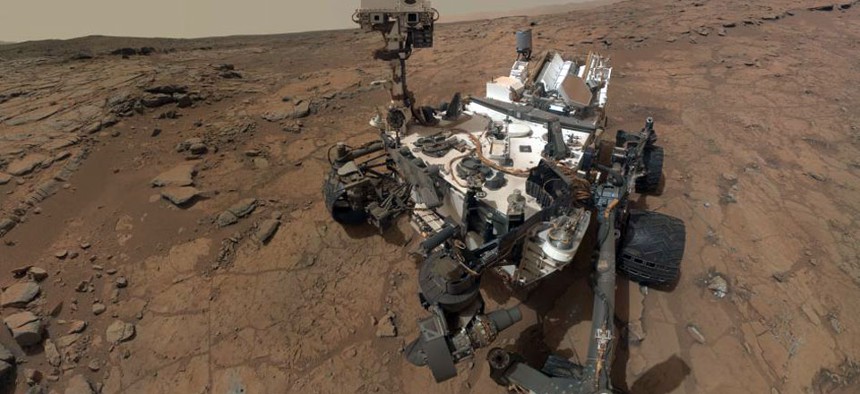How Curiosity Became an Astronaut

This self-portrait of NASA's Mars rover Curiosity combines dozens of exposures taken by the rover's Mars Hand Lens Imager. NASA
From the earliest years of the space program, the exploration of other worlds has been a source of the same techno-anxieties we have today.
The most memorable thing was the tears. They were the result, for the most part, of the tensions of the "Seven Minutes of Terror." And of hope. And of anticipation. And of the knowledge that so many people had invested a significant portion of their lives in this one moment -- and the knowledge, as well, of how easily it could all go wrong.
Nothing went wrong. At approximately 1:30 am East Coast time on August 5, 2012, the control room at the Jet Propulsion Laboratory in Pasadena, California, erupted with cheers, high fives, hugs, relief, and, yes, tears. The Curiosity rover, which had taken several years to be built and another year to travel away from Earth, had landed safely on the surface of Mars.
And it's a good thing it did: had something gone wrong, there would have been a good chunk of humanity on hand to witness the failure. Members of the public had gathered together at watch parties -- including an enormous one on the streets of New York's Times Square -- to observe the landing as it happened. Millions more were watching the landing at home, through NASA's live stream. NASA had chosen, at considerable risk, to make Curiosity's landing on Mars an event, a spectacle, a drama that unfolded in nearly real time: one small step for a robot, one giant leap for robotkind.
Since then, in large part as a result of that initial spectacle, Curiosity has enjoyed a level of celebrity rarely accorded to mere machines. Even its most mundane activities -- scooping dirt, taking a break, finding a rock -- are newsworthy. More than a million people follow the rover's Twitter feed. A replica of Curiosity marched -- well, "marched" -- in President Obama's second inaugural parade.
That we would care so much about a robot on a distant planet seems oddly logical and entirely fitting in an age that has seen the retirement of the space shuttle program and the beginning of space as an everyday reality show. With the International Space Station serving as the only outlet for the world's remaining astronauts, space explorers have undergone a fairly abrupt transition from "explorers" to "homemakers." We Earthbound creatures crave new stories about the next frontier. But since humans haven't gone beyond low-earth orbit for decades, we're left with machines. Curiosity, the cheeky little rover that could, is filling the void.
NEXT STORY: One Kickstarter Could Revolutionize 3D Printing





